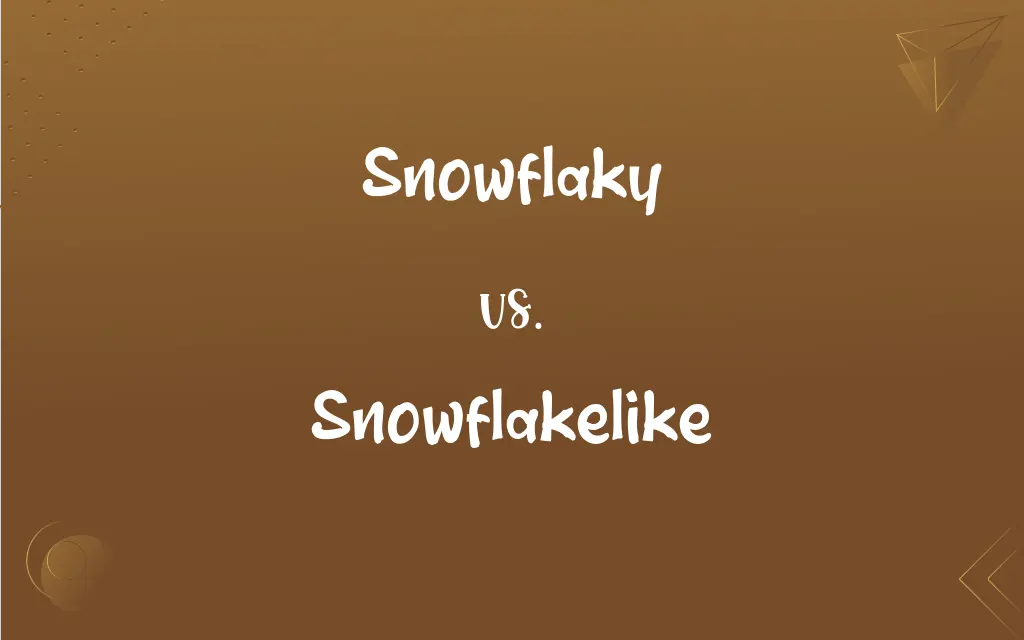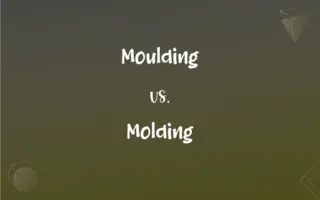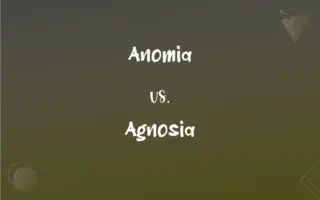Snowflaky vs. Snowflakelike: What's the Difference?
By Harlon Moss & Aimie Carlson || Updated on May 29, 2024
"Snowflaky" describes someone or something that exhibits the delicate, unique, or sensitive characteristics of a snowflake, often in a metaphorical sense. "Snowflakelike" refers to something that resembles or has qualities similar to a snowflake, typicall

Key Differences
"Snowflaky" often describes a person or behavior characterized by perceived fragility or sensitivity, frequently used metaphorically. For example, someone might be described as "snowflaky" if they are seen as overly delicate or easily offended, mirroring the unique and delicate nature of a snowflake. "Snowflakelike," on the other hand, is more literal and describes an object or entity that physically or aesthetically resembles a snowflake. This term is typically used to describe patterns, structures, or appearances that mimic the intricate design of actual snowflakes.
In language, "snowflaky" carries a subjective tone, often implying judgment about someone's emotional resilience. This usage can be contentious as it reflects societal attitudes towards sensitivity and emotional expression. Conversely, "snowflakelike" is neutral and descriptive, focusing solely on visual or structural similarities to snowflakes. It does not carry the same connotations of emotional sensitivity and is used to describe appearances in various contexts, such as art, design, or nature.
"Snowflaky" is more likely to be found in informal speech or writing, especially in contexts where social commentary or personal traits are being discussed. It is a more recent addition to the lexicon, emerging from contemporary cultural discourse. "Snowflakelike" is more universally applicable across different contexts, from scientific descriptions of ice crystals to artistic representations in various media. Its use is straightforward and lacks the nuanced connotations of "snowflaky."
Comparison Chart
Usage
Metaphorical description of sensitivity
Literal description of resemblance
Tone
Subjective, often judgmental
Neutral, descriptive
ADVERTISEMENT
Context
Informal, social commentary
Formal, scientific, artistic
Connotation
Emotional fragility
Visual or structural similarity
Commonality
Less common, contemporary
More common, universally applicable
Snowflaky and Snowflakelike Definitions
Snowflaky
Exhibiting unique or special traits.
Her snowflaky ideas stood out in the meeting.
Snowflakelike
Intricately detailed as a snowflake.
Her artwork was snowflakelike in detail.
ADVERTISEMENT
Snowflaky
Fragile or delicate in demeanor.
She acted snowflaky when criticized.
Snowflakelike
Resembling a snowflake in appearance.
The frost on the window was snowflakelike.
Snowflaky
Emotionally delicate.
The team's snowflaky response surprised everyone.
Snowflakelike
Mimicking the pattern of a snowflake.
The lace had a snowflakelike design.
Snowflaky
Easily offended or upset.
His snowflaky behavior annoyed his friends.
Snowflakelike
Displaying qualities of a snowflake.
The decorations were beautifully snowflakelike.
Snowflaky
Perceived as overly sensitive.
He was labeled snowflaky for his reaction.
Snowflakelike
Having a structure similar to a snowflake.
The crystal formations were snowflakelike.
Snowflaky
(informal) snowflakelike
Snowflakelike
Resembling or characteristic of a snowflake.
FAQs
Is "snowflaky" a formal term?
No, it's more informal and often used in social commentary.
Can "snowflakelike" be used to describe people?
Generally no, it describes physical resemblance to a snowflake.
Does "snowflaky" have a positive or negative connotation?
Often negative, implying emotional fragility.
What does "snowflaky" mean?
It describes someone or something perceived as delicate or overly sensitive.
What type of word is "snowflakelike"?
It's an adjective describing resemblance.
Where is "snowflakelike" commonly used?
In scientific, artistic, or descriptive contexts.
Is "snowflakelike" subjective?
No, it is objective and descriptive.
Can "snowflaky" be considered offensive?
Yes, it can be seen as dismissive or belittling.
Does "snowflakelike" carry any connotations?
No, it's neutral.
Can "snowflakelike" describe patterns?
Yes, especially those mimicking snowflakes.
Are both terms adjectives?
Yes, they both describe qualities.
Is "snowflaky" a recent term?
Yes, it’s more contemporary.
How is "snowflaky" used in a sentence?
E.g., "Her reaction was quite snowflaky."
Is "snowflakelike" scientifically accurate?
Yes, it describes precise resemblance.
Does "snowflaky" refer to actual snowflakes?
No, it’s metaphorical.
What is the origin of "snowflaky"?
It comes from cultural discourse on sensitivity.
Can "snowflakelike" be used in art?
Yes, commonly to describe intricate designs.
Can "snowflaky" be used positively?
Rarely, usually it’s negative.
Can "snowflakelike" be used in everyday conversation?
Yes, especially in descriptive contexts.
Is "snowflaky" common in literature?
Less common, more prevalent in modern dialogue.
About Author
Written by
Harlon MossHarlon is a seasoned quality moderator and accomplished content writer for Difference Wiki. An alumnus of the prestigious University of California, he earned his degree in Computer Science. Leveraging his academic background, Harlon brings a meticulous and informed perspective to his work, ensuring content accuracy and excellence.
Co-written by
Aimie CarlsonAimie Carlson, holding a master's degree in English literature, is a fervent English language enthusiast. She lends her writing talents to Difference Wiki, a prominent website that specializes in comparisons, offering readers insightful analyses that both captivate and inform.































































